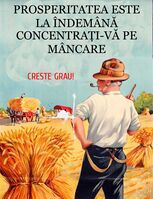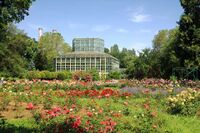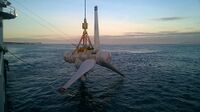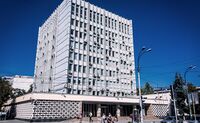Genesis Initiative: Difference between revisions
Caradia Gov (talk | contribs) No edit summary |
|||
| Line 1: | Line 1: | ||
The '''Genesis Initiative''', or '''Inițiativa Geneza''' in Sarnechi, is a plan put into motion by the [[Nova Caradia]]n Ministry of Finance to give the national economy an industrial boost after having to restart following the destruction of the [[Caradia|Duchy]]. The plan included proposals to increase government spending in order to increase jobs and to introduce regulations and standardisation into the economy, including the introduction of the [[Nova Caradian cupru]] as the national currency. | The '''Genesis Initiative''', or '''Inițiativa Geneza''' in Sarnechi, is a plan put into motion by the [[Nova Caradia]]n Ministry of Finance to give the national economy an industrial boost after having to restart following the destruction of the [[Caradia|Duchy]]. The plan included proposals to increase government spending in order to increase jobs and to introduce regulations and standardisation into the economy, including the introduction of the [[Nova Caradian cupru]] as the national currency. | ||
The initiative was created by Ilie Rastesc, Minister of Finance in [[Prime Minister of Nova Caradia|Prime Minister]] [[Milana Împotriva]]'s cabinet. As a member of the Partid Conservator Național, Ilie called for the expansion of Nova Caradian interests and presence in southern [[Eura]], including his pushing of the controversial "Verde Auriu", or "Golden Green" policy that would allow Nova Caradian farmers the full protection of the state against raids by stateless peoples if they should settle in unclaimed lands within 100 kilometers of the Nova Caradian border. | The initiative was created by Ilie Rastesc, Minister of Finance in [[Prime Minister of Nova Caradia|Prime Minister]] [[Milana Împotriva]]'s cabinet. As a member of the Partid Conservator Național, Ilie called for the expansion of Nova Caradian interests and presence in southern [[Eura]], including his pushing of the controversial "Verde Auriu", or "Golden Green" policy that would allow Nova Caradian farmers the full protection of the state against raids by stateless peoples if they should settle in unclaimed lands within 100 kilometers of the Nova Caradian border. | ||
== Energy == | |||
Focus of the initiative was first placed upon the creation of a suitable electric power grid to replace salvaged fossil fuel generators and provide power for vast swaths of powerless farmland. In this area, renewable energy was favoured due to its unlimited quantity. Installations of solar panels in newly constructed solar farms in the fields of the Ufini district soon commenced under pay from the government. Wind energy was also considered, with the construction of a wind farm on the coastline of Ufini, which has frequent heavy wind from the antarctic. | |||
The largest project undertaken through the energy modernisation section of the initiative was the construction of the Apă Electrică (Electric Water) tidal power plant outside [[Rorfast]]. Construction was planned to proceed slowly in order to integrate completed sections of the power plant as they were finished into the power grid. | |||
== Military == | |||
Military spending began with the standardisation of equipment via a standardised naming system and the purchase of equipment from private firms and contractors. Equipment included weapons for use in all areas of the armed forces, including firearms, combat vehicles, naval ships, and airships. The company contracted for the military's airships, [[Zboruri la Orizont]], used the profit from this purchase to construct civilian cargo airships to transport supplies over the sea between the islands and the mainland. | |||
== Gallery == | == Gallery == | ||
Revision as of 06:38, 22 November 2020
The Genesis Initiative, or Inițiativa Geneza in Sarnechi, is a plan put into motion by the Nova Caradian Ministry of Finance to give the national economy an industrial boost after having to restart following the destruction of the Duchy. The plan included proposals to increase government spending in order to increase jobs and to introduce regulations and standardisation into the economy, including the introduction of the Nova Caradian cupru as the national currency.
The initiative was created by Ilie Rastesc, Minister of Finance in Prime Minister Milana Împotriva's cabinet. As a member of the Partid Conservator Național, Ilie called for the expansion of Nova Caradian interests and presence in southern Eura, including his pushing of the controversial "Verde Auriu", or "Golden Green" policy that would allow Nova Caradian farmers the full protection of the state against raids by stateless peoples if they should settle in unclaimed lands within 100 kilometers of the Nova Caradian border.
Energy
Focus of the initiative was first placed upon the creation of a suitable electric power grid to replace salvaged fossil fuel generators and provide power for vast swaths of powerless farmland. In this area, renewable energy was favoured due to its unlimited quantity. Installations of solar panels in newly constructed solar farms in the fields of the Ufini district soon commenced under pay from the government. Wind energy was also considered, with the construction of a wind farm on the coastline of Ufini, which has frequent heavy wind from the antarctic.
The largest project undertaken through the energy modernisation section of the initiative was the construction of the Apă Electrică (Electric Water) tidal power plant outside Rorfast. Construction was planned to proceed slowly in order to integrate completed sections of the power plant as they were finished into the power grid.
Military
Military spending began with the standardisation of equipment via a standardised naming system and the purchase of equipment from private firms and contractors. Equipment included weapons for use in all areas of the armed forces, including firearms, combat vehicles, naval ships, and airships. The company contracted for the military's airships, Zboruri la Orizont, used the profit from this purchase to construct civilian cargo airships to transport supplies over the sea between the islands and the mainland.
Gallery
-
Poster encouraging farmers to grow wheat
-
Rorfast Grădini, an example of public works funding
-
Apă Electrică tidal power plant, under construction
-
Nova Caradia national bank



